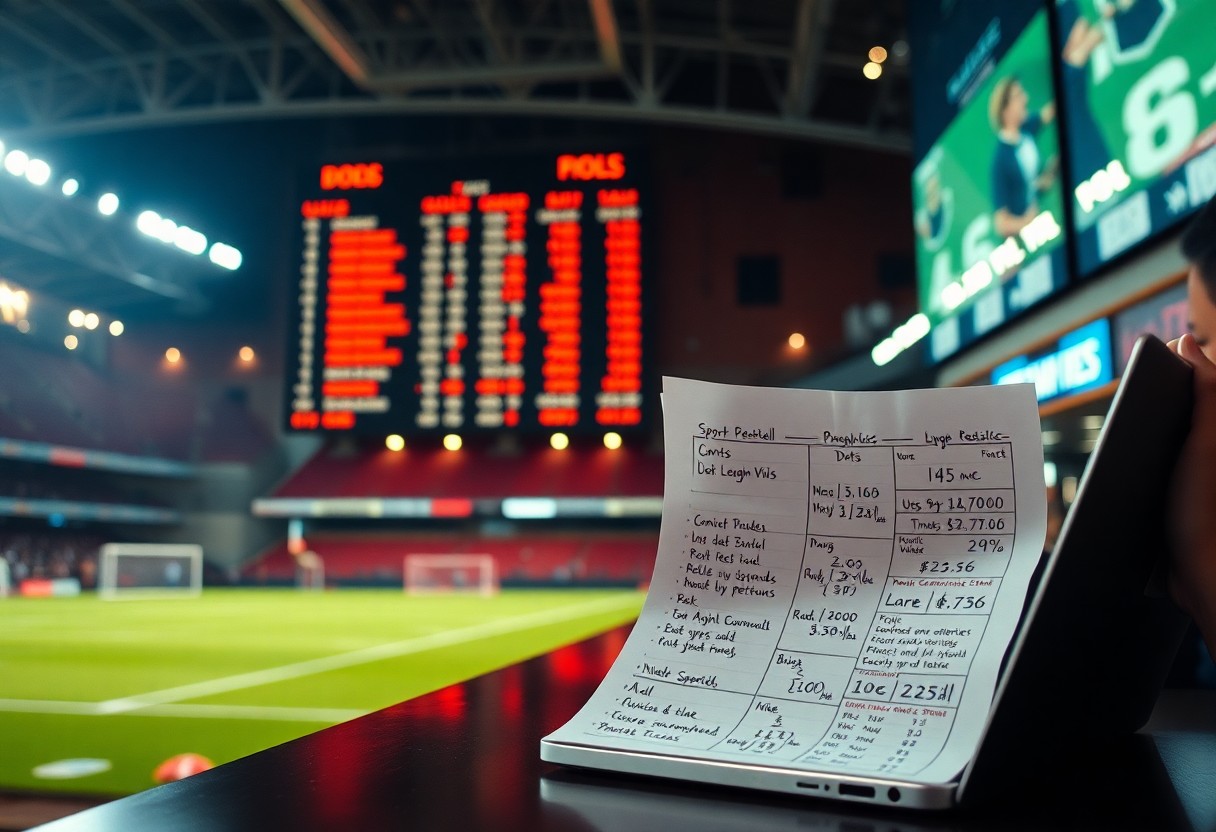You can significantly improve your betting strategy by mastering the art of calculating optimal betting odds. This skill allows you to assess risks and make informed decisions that can lead to higher payouts and minimize losses. In this guide, you will learn the crucial techniques and formulas that will empower you to evaluate odds effectively. Understanding how to analyze betting lines and probabilities is your key to betting success in various sports and events. Let’s examine the expert insights that will elevate your betting game!
Understanding Betting Odds
The world of betting odds can seem complex, but at its core, it provides a straightforward way to gauge the likelihood of an event occurring. Understanding these odds is vital for making informed decisions and maximizing your betting strategies.
Definition of Betting Odds
An effective way to comprehend betting odds is to view them as a reflection of an outcome’s probability, expressed in varying formats. They indicate how much you stand to win against your stake, providing a transparent glimpse into the bookmaker’s expectations regarding an event.
Types of Betting Odds
Types of betting odds come in several formats that cater to diverse preferences, each offering specific insights into the betting landscape:
| Decimal Odds | Common in Europe, showcasing total payout plus stake. |
| Fractional Odds | Mainly used in the UK, representing profit relative to stake. |
| Moneyline Odds | A popular American format, indicating how much to wager for a set return. |
| Implied Probability | Represents the probability of an outcome as calculated from the odds. |
| Asian Handicap | Balances two teams by giving one a virtual advantage. |
Odds can significantly impact your betting strategies and overall experience. You will want to familiarize yourself with the different formats to better assess the potential returns and risks associated with each wager. Here’s a summary of key points regarding betting odds:
- Understanding odds formats enhances your betting experience.
- Calculating potential payouts allows for informed wagering decisions.
- Comparing odds from different bookmakers can lead to better value bets.
- Recognizing implied probability helps gauge the likelihood of outcomes.
- Assume that a clear grasp of these elements will lead to improved betting strategies.
In the long run, a clear understanding of different contexts for odds will empower your betting journey. By immersing yourself in their types and implications, you can boost your chances for success and make confident wagers.
Key Factors in Calculating Betting Odds
Assuming you want to master the art of betting odds, it’s crucial to consider several key factors that can influence your calculations. These include:
- Statistical Analysis
- Market Trends
- Public Perception
- Historical Data
Thou should ensure these elements are evaluated to make informed betting decisions.
Statistical Analysis
You can enhance your betting strategies through effective statistical analysis. By leveraging past performance data and assessing the risk-to-reward ratio, you can determine how likely an outcome is to occur. This data-driven approach allows you to establish fair odds that reflect the true probabilities of various outcomes.
Market Trends
An understanding of market trends is vital to staying ahead in betting. You should pay attention to how odds fluctuate based on public sentiment, injuries, or other factors influencing a game or event.
The landscape of betting is continually shifting, driven by market trends which can impact odds significantly. You may observe odds changing as more bettors become aware of certain factors, like a player’s injury or recent winning streaks. By tracking these market dynamics, you can place your bets at optimal times, potentially capitalizing on mismatched odds. Keep in mind, being informed on these trends can help you navigate potential risks while maximizing your betting opportunities.
How to Calculate Optimal Betting Odds
Your journey to mastering betting odds starts with understanding how to calculate them optimally. By identifying the true probability of an event and translating that into odds, you can gain a significant edge over bookmakers. Knowing how to calculate these odds allows you to know when to place your bets and maximize your potential returns.
Step-by-Step Calculation Process
For an effective calculation of betting odds, follow this step-by-step guide:
| Step | Description |
| 1 | Determine the true probability of the event. |
| 2 | Convert the probability into decimal odds (1 / probability). |
| 3 | Adjust the odds for the bookmaker’s margin. |
| 4 | Compare with offered odds to find value bets. |
Utilizing Betting Models
Some advanced bettors use analytical techniques and data-driven insights to optimize their betting strategies through various models. These models help predict outcomes based on historical data, team performance, and other relevant factors.
A key aspect of utilizing betting models is understanding their strengths and limitations. While models can significantly enhance your betting strategy by providing data-driven predictions, they can also introduce risks. It’s important to ensure your model incorporates the latest statistics and adjusts for real-time factors. Having an adaptable model can lead to a positive betting experience, enhancing your chance to spot value bets and capitalize on favorable odds.
Tips for Adjusting Odds
After establishing your initial odds, be prepared to adjust them based on various factors. Consider these important aspects for effective adjustments:
- Market Trends
- Betting Public Sentiment
- Player Performance
- Injury Reports
The right adjustments can significantly impact your betting strategy.
Monitoring Real-Time Changes
Tips for staying agile in your betting approach include tracking shifts in odds closely. Utilize real-time data and analytics tools that provide insights into market movements and help you respond swiftly.
Considering Risk Factors
You must evaluate potential risks that could affect your betting decisions. Focus on these crucial risk considerations:
- Team Form
- Weather Conditions
- Historical Matchup Data
- Player Injuries
Perceiving these risk factors allows for informed adjustments to your betting strategy.
Monitoring variables that can impact the game is vital for success in betting. It is crucial to analyze team form, as teams in great shape perform better. Understanding weather conditions can also affect gameplay outcomes, especially in outdoor sports. Consult historical matchup data for insights into how teams perform against one another, and keep track of player injuries since a missing key player can shift the odds dramatically. Perceiving these factors enhances your ability to make informed betting decisions.
Advanced Techniques for Betting Odds
All betting enthusiasts can elevate their game by mastering advanced techniques for calculating betting odds. Engaging with these strategies can provide deeper insights and improve your betting experience. Here are some key methods you should explore:
- Applying Probability Theory
- Leveraging Historical Data
- Using Statistical Models
- Understanding Market Movements
| Technique | Description |
|---|---|
| Applying Probability Theory | Utilizing fundamental probability concepts to assess true outcomes. |
| Leveraging Historical Data | Analyzing past performances to forecast future results. |
| Using Statistical Models | Employing equations and parameters to predict odds. |
| Understanding Market Movements | Tracking shifts in odds and public betting trends. |
Applying Probability Theory
Any serious bettor should familiarize themselves with probability theory to make informed decisions. It involves understanding the likelihood of certain outcomes based on random events, enabling you to evaluate potential returns against the risk involved. By applying probability to your bets, you can create more accurate odds and identify favorable situations.
Leveraging Historical Data
Probability. Making use of historical data can significantly enhance your betting strategy. By studying past performances, you gain insights that can inform your decisions on current bets. This analysis allows you to spot trends, such as team strengths or weaknesses, and gives you the ability to calculate more precise odds.
To effectively leverage historical data, start compiling relevant statistics that reflect team performance, injuries, and other factors over time. The patterns you uncover are just as important as your instincts. Utilizing this data helps you understand team dynamics and potential outcomes, allowing for smarter bets. Be cautious of relying solely on past data as it may not account for recent changes, but it is an necessary tool for crafting a well-rounded betting strategy.
Common Mistakes to Avoid
Keep a close eye on your strategies and approach. Oversights in your betting calculations can lead to poor decisions and unexpected losses. Always double-check your odds, stay informed, and make the necessary adjustments to enhance your betting experience.
Overlooking Important Variables
While you may focus heavily on statistics, neglecting other factors such as injuries, weather, and team dynamics can skew your odds. These variables play a critical role in the outcome of events and should be integral to your betting strategy.
Ignoring Market Sentiment
Some bettors make the mistake of dismissing market sentiment, which can significantly impact betting odds. To optimize your strategy, you must stay attuned to public perception and trends. Understanding how the majority perceives a team or player can lead to more informed decisions. Straying from the crowd can sometimes be advantageous; however, ignoring the general sentiment may cause you to miss out on valuable insights that reflect where the money is flowing. This awareness can improve your edge when setting your preferred betting odds.
To wrap up
So, by implementing these expert insights on calculating optimal betting odds, you can enhance your betting strategy and make more informed decisions. Understanding the mathematics behind the odds allows you to identify value bets and maximize your potential returns. Always consider the factors influencing the odds, and don’t forget to analyze your data consistently. With practice and a solid approach, you’ll be well-equipped to navigate the complexities of betting odds effectively.




